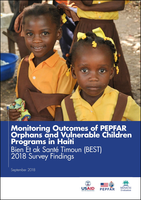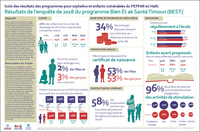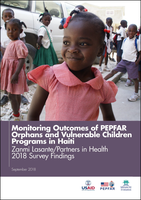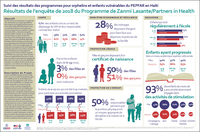Monitoring Outcomes of PEPFAR Orphans and Vulnerable Children Programs in Haiti
Globally, PEPFAR has invested considerable resources in orphans and vulnerable children (OVC) programs but has not studied systematically or on a large scale the effect of its programs on the well-being of beneficiary OVC and households. To fill this gap, in 2014, PEPFAR introduced a new global reporting requirement for monitoring the outcomes of its OVC programs, referred to as the monitoring, evaluation, and reporting (MER) OVC Essential Survey Indicators (ESIs).
In 2017, the PEPFAR Haiti OVC team requested the assistance of the USAID-funded project, MEASURE Evaluation, to collect data for the MER OVC ESI for two of its OVC projects:
- “Reinforcing HIV Clinical Services within a Network of Public Health Institutions in the Central Plateau and the Lower Artibonite of Haiti under the President’s Emergency Plan for AIDS Relief (PEPFAR)” implemented by PIH and funded through the CDC 4 Survey Results for the Partners in Health OVC Program
- BEST project, implemented by the Caris Foundation and funded through USAID
MEASURE Evaluation, in partnership with its subcontractor SEFIS, conducted two household surveys, one for each project, to collect data for the OVC ESI. The methods used for both surveys was similar and followed established guidance.
The following materials present our findings.
















